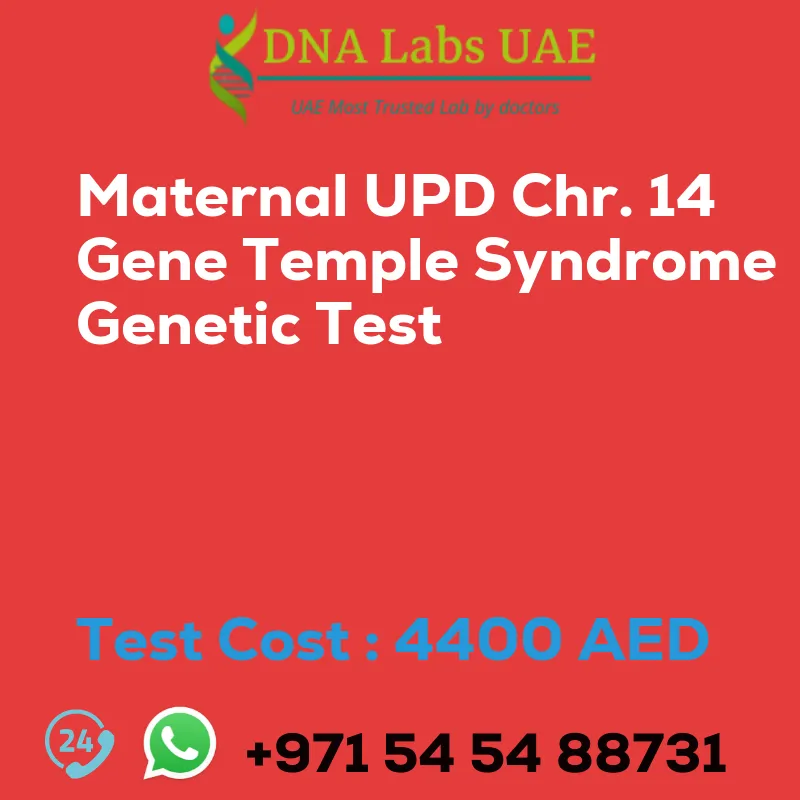Maternal UPD chr. 14 Gene Temple Syndrome Genetic Test
Introduction
Maternal UPD (Uniparental Disomy) chr. 14 refers to a genetic condition where an individual inherits both copies of chromosome 14 from their mother, instead of one copy from each parent. This occurs when there is an error in the process of chromosome segregation during egg formation.
Maternal UPD chr. 14 can result in a variety of symptoms and health issues, including developmental delays, intellectual disability, growth abnormalities, and distinctive facial features. Gene Temple syndrome is a term that is sometimes used to describe the combination of maternal UPD chr. 14 and Temple syndrome.
Temple syndrome, also known as 14q32 imprinting center defect, is a rare genetic disorder caused by abnormalities in the region of chromosome 14 known as the 14q32 imprinted region. It is characterized by growth restriction, early puberty, and a specific pattern of facial features.
Test Details
The maternal UPD chr. 14 Gene Temple Syndrome Genetic Test offered by DNA Labs UAE utilizes NGS (Next-Generation Sequencing) Technology. This advanced sequencing technology allows for the analysis of an individual’s DNA to detect various genetic mutations, including those associated with maternal UPD chr. 14 and Temple syndrome.
Test Name: Maternal UPD chr. 14 Gene Temple Syndrome Genetic Test
- Components: NGS Technology
- Price: 4400.0 AED
- Sample Condition: Blood or Extracted DNA or One drop Blood on FTA Card
- Report Delivery: 3 to 4 Weeks
- Test Type: Dysmorphology
- Doctor: Pediatrics
- Test Department: Genetics
- Pre Test Information: Clinical History of Patient who is going for maternal UPD chr. 14 Gene Temple Syndrome NGS Genetic DNA Test. A Genetic Counselling session to draw a pedigree chart of family members affected with maternal UPD chr. 14 Gene Temple Syndrome NGS Genetic DNA Test gene maternal UPD chr. 14
Conclusion
The maternal UPD chr. 14 Gene Temple Syndrome Genetic Test is an important tool for diagnosing and managing maternal UPD chr. 14 and Temple syndrome. By utilizing NGS Technology, DNA Labs UAE can provide accurate and detailed genetic testing services to help individuals and their families understand and manage these genetic conditions.
| Test Name | maternal UPD chr. 14 Gene Temple syndrome Genetic Test |
|---|---|
| Components | |
| Price | 4400.0 AED |
| Sample Condition | Blood or Extracted DNA or One drop Blood on FTA Card |
| Report Delivery | 3 to 4 Weeks |
| Method | NGS Technology |
| Test type | Dysmorphology |
| Doctor | Pediatrics |
| Test Department: | Genetics |
| Pre Test Information | Clinical History of Patient who is going for maternal UPD chr. 14 Gene Temple syndrome NGS Genetic DNA Test. A Genetic Counselling session to draw a pedigree chart of family members affected with maternal UPD chr. 14 Gene Temple syndrome NGS Genetic DNA Test gene maternal UPD chr. 14 |
| Test Details |
Maternal UPD (Uniparental Disomy) chr. 14 refers to a genetic condition where an individual inherits both copies of chromosome 14 from their mother, instead of one copy from each parent. This occurs when there is an error in the process of chromosome segregation during egg formation. Maternal UPD chr. 14 can result in a variety of symptoms and health issues, including developmental delays, intellectual disability, growth abnormalities, and distinctive facial features. Gene Temple syndrome is a term that is sometimes used to describe the combination of maternal UPD chr. 14 and Temple syndrome. Temple syndrome, also known as 14q32 imprinting center defect, is a rare genetic disorder caused by abnormalities in the region of chromosome 14 known as the 14q32 imprinted region. It is characterized by growth restriction, early puberty, and a specific pattern of facial features. NGS (Next-Generation Sequencing) Genetic Test is a type of genetic testing that uses advanced sequencing technology to analyze an individual’s DNA. NGS can be used to detect various genetic mutations, including those associated with maternal UPD chr. 14 and Temple syndrome. This type of genetic testing can help diagnose these conditions, determine the underlying genetic cause, and provide information for medical management and genetic counseling. |








